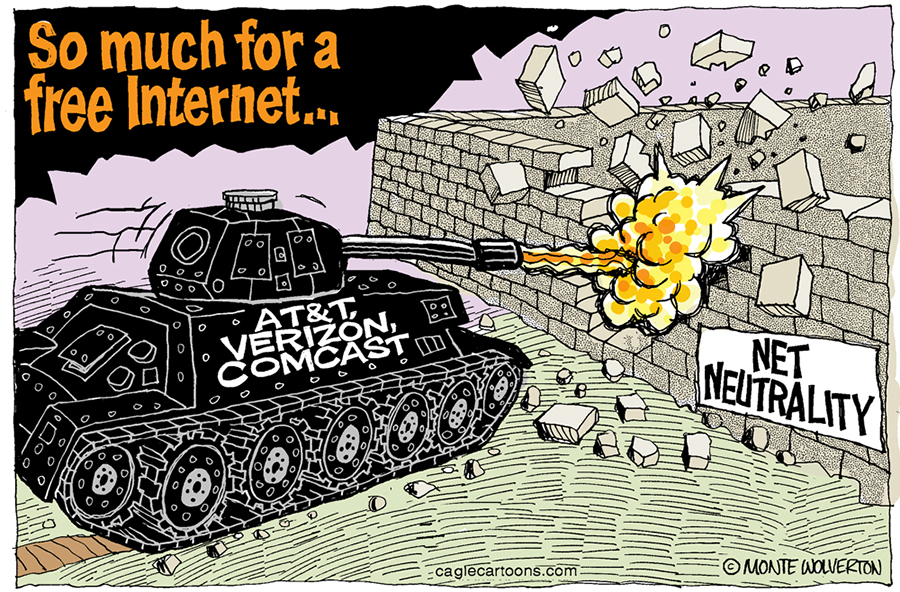
The struggle for an Internet commons – or digital commons, of which net neutrality is an operating principle – is important to everyone. But it’s uniquely important to activists and artists – people who think, work and live outside the box, people fighting in whatever way we each fight for a fairer world. Right now, our commons is under imminent threat by new Federal Communications Commission rules that will end net neutrality – a moment requiring all of us to raise our voices and be heard during this slim window of public comment.
The original vision of the Internet's pioneers was to create a field of communication and exchange in which we would all, in civil society, take part. In many ways, our very participation in – and preservation of – democracy depends on it. The fights to beat back previousanti-Internet bills like SOPA and PIPA provoked a tsunami of public outcry. Now, the public needs to get loud again to halt our corporate office-holders in the FCC from crushing basic online freedom.
That’s not just my recommendation, but the unanimous urging of Amalia Deloney, associate director of the [Center for Media Justice](http:// http://centerformediajustice.org/), Jessica Gonzalez, executive VP and general counsel of the National Hispanic Media Coalition, and former Rhode Island Rep. David Segal, executive director of Demand Progress, among many others. I spoke with each of them in the wake of FCC regulators’ new proposed rules to allow Internet “fast lanes” that would produce a game-changing, tiered-Internet system devastating to small businesses, nonprofits, independent media sites, non-corporatist political groups and independent artists everywhere.
In a nutshell, the rules being pushed by FCC head Tom Wheeler would give companies (read: those with money) the option of paying more to receive faster access online. And the takeaway is this: a multi-tiered Internet will leave us, the 99%, out in the cold.
Wheeler proposed the rules at the end of April; the “Notice of Proposed Rulemaking” will be officially posted May 15. The public, along with big corporations, have 30 days to comment on the rules. This comment period is crucial: it can swing legislative committees and votes, and influence courts that might later decide on the fairness and propriety of those rules.
We already know what the stakes are, and there’s much fine, comprehensive content articulating them. It may be more enlightening to describe the stakes on the other side—big telecom, the wannabe Internet overlords, for whom every chunk chipped away from the commons is more money in their bank accounts. The ruling class finds net neutrality intolerable, and spends more than a little time trying to pick apart its ideology. By way of one example, there's a “free market” e-forum called netcompetition.org representing a bunch of suits and ties working for big telecom, and they publish “white papers” as resources for other suits and ties to use to fight us net neutrality ideologues. Their white paper, “Neutralism: Identifying the Commons Ideology behind Net Neutrality," reads as a sort of Naked Communist of the net neoliberalism crowd. After profiling the “founders” of the digital commons movement and articulating the ideology of the commons, the report reaches an unpleasant conclusion.
Net neutrality is more than a contentious public policy issue in Washington. It is the public branding of a new, niche, but growing ideology and school of economic thought, which is most logically called neutralism. This white paper’s core conclusion is that the ideological tension will only increase between the competing visions: calling for a new mandated digital commons vs. defending the existing free market based on property rights. That is because the underlying trends creating the pre-conditions for neutralism are likely to persist and accelerate — i.e. the declining cost economics of digital abundance, and the increased adoption of Internet social “Web 2.0” applications.
While it’s true that technology gives a boost to the Internet commons movement, another force is also at work: practitioners and advocates of the commons, part of an emerging egalitarian consensus, who believe, like Amalia Deloney, that “the stakes have never been higher.” I asked Gonzalez, Segal and Deloney why this struggle was so important. I played devil’s advocate: “Small businesses, small and alternative press, and nonprofits have always gotten the rocks in mass communications technology,” I said, “but they've persisted. Why are the stakes different with the Internet? Why is this particular public commons worth our militancy, given the long history of other independent media struggles?”
“Let me push back,” Gonzalez replied. “This isn’t just about business. This is about a true democracy where everyone has equal access to the public square. That was never the case before the Internet came around with all its openness and fairness, especially for people of color. We want to keep the communications lines open to everyone, not just a few wealthy companies.”
For Deloney, the uniqueness of the Internet is based on the oft-stated promise of the Internet: precisely because of previous inequalities, networked communications technology promised an egalitarian telecommunication and information field; a commons. Now, with a terminally weak economy and hundreds of nonprofits and media groups helping build a new economy, and with the commons under attack by privatization everywhere, “this is not a moment to capitalize on people’s needs.”
Segal is concerned about “access to information from heterodox sources,” which the Internet has made available to everyone in an unprecedented way. As traditional media sources have closed down and dried up (a consequence of following a myopic, profit-driven model), the diversity of information available to the public has increased. “The end of net neutrality threatens to undermine all of that,” Segal says, and saving the public commons is “worthy of aggressive activism.”
This threat to the commons for advocacy groups and nonprofits happens on top of all of the other ways in which a tiered Internet hurts the public good. Internet connectivity provides access to searches and applications for jobs and housing. It’s parents’ mechanism for kids’ school information. People need it to pay bills, check immigration status, organize and participate in community events. Rural areas desperately need the Internet for coordination of services and infrastructure. It’s also become a mechanism for civil emergency coordination. And to be sure, it already makes a lot of people very rich as it is. The rest of us shouldn’t have to pay more to access our democratic rights and public goods.
The key to acceptable FCC rules, Segal points out, is that they must include “reclassification” of the Internet as a public utility. The ACLU [http://kbia.org/post/qa-policy-advisor-aclu-net-neutrality] is only one of a number of organizations that say reclassification is the best possible protection of net neutrality. The consensus of the folks I interviewed is that using the FCC’s public comments period, and making some direct calls to legislators are worthwhile, even if imperfect tactics in the urgent matter of heading off the FCC’s proposed initial foray into tiering. Segal’s group, Demand Progress, will be “helping coordinate comments, and also encouraging broader and deeper activism over the course of the summer no matter what the NPRM looks like. If it doesn’t include reclassification we’ll have to encourage people to vote it down.”
Similarly, the National Hispanic Media Coalition will “be filing detailed comments,” and “are happy to walk others through how to do the same,” Gonzalez says. “The people must stand up and make their voices heard to counterbalance the tremendous corporate lobbying taking place.” She suggests that everyone email the FCC (openinternet@fcc.gov) and “insist that FCC Chairman Tom Wheeler treat Internet access as the public utility that it is, and ban discrimination.” Segal suggests picking up the phone and calling legislators, too. A petition [http://act.rootsaction.org/p/dia/action3/common/public/?action_KEY=9726] sponsored by Demand Progress and RootsAction.org demanding commitment to “the principle of equal access to the Internet” had sent 40,000 emails to each of the FCC commissioners in the 24 hours that began with Wheeler’s announcement last Thursday morning.
There are larger concerns, of course. Legislators need to learn that the voices for the commons are loud and strong. More businesses--especially small businesses--need to come around on neutrality and stop thinking like the 1%. But a victory here and now greases the wheels for larger wins down the road. It will show everyone, including us, what we can do. And the public comments period is an opportunity to permanently inscribe our voices alongside those of the corporate suits and ties, whatever the outcome.
Matt Stannard edits politicalcontext.org and works for BankACT, a nonprofit advocacy group promoting public and postal banking.
3 WAYS TO SHOW YOUR SUPPORT
- Log in to post comments
















